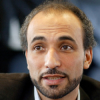Tariq Ramadan

Tariq Ramadan
Tariq Ramadanis a Swiss academic, philosopher and writer. He is the professor of Contemporary Islamic Studies in the Faculty of Oriental Studies at St Antony's College, Oxford and also teaches at the Oxford Faculty of Theology. He is a visiting professor at the Faculty of Islamic Studies, the Université Mundiapolisand several other universities around world. He is also a senior research fellow at Doshisha University. He is the director of the Research Centre of Islamic Legislation and Ethics, based in...
NationalitySwiss
ProfessionWriter
Date of Birth26 August 1962
CountrySwitzerland
The world is a complex place, and the influence of the media in its representation and its power of communication and interpretation is a remarkable amplifier of emotions, and of illusions.
Globalisation means indeed everything is global but there are still very specific centres of power, especially when it comes to media and news.Misinformation about some attacks is going to affect how emotionally involved the audience is going to get. In the end, an emotional ranking is artificially created when it comes to casualties.
The media is putting a lot of emphasis on the few people that are destroying, while it won't report on the silent majority of people who are constructing, building and trying to find their way.
The challenge for Muslims in America is to respect the fears of ordinary people while resisting the exploitation of those fears by political parties, lobbies and sectors of the media. To meet this challenge, Muslims must reassess their own involvement, behavior and contributions in American society.
We have to be the media when media is silent
We have to be very cautious not to accept the scam of polarization we see in the media. It is not in fact between secularists and Islamists, it is a battle within the Islamic reference.
It's clear there is nothing in my record supporting terrorism.
We all cherish freedom of speech, but with a reasonable approach and a reasonable use of it. If we come to this, it is a debate. If not, then it is a power struggle. Who is going to win, the Muslim principles or the Western principles?
I've never suffered because of my heritage in Europe.
Many U.S. organizations believe that I am being barred from the country not because of my actions but because of my ideas. The conclusion seems inescapable.
We've got to get away from the idea that scholars in the Islamic world can do our thinking for us. We need to start thinking for ourselves.
The rich stick together; the poor and the marginalised are thrown together.
Cultures, along with the religions that shape and nurture them, are value systems, sets of traditions and habits clustered around one or several languages, producing meaning: for the self, for the here and now, for the community, for life.
If religious people deny paradise to their opponents or to 'non-believers,' atheists would likewise seek to eliminate 'dangerous' believers with their 'childish' ways and their heads in the clouds.